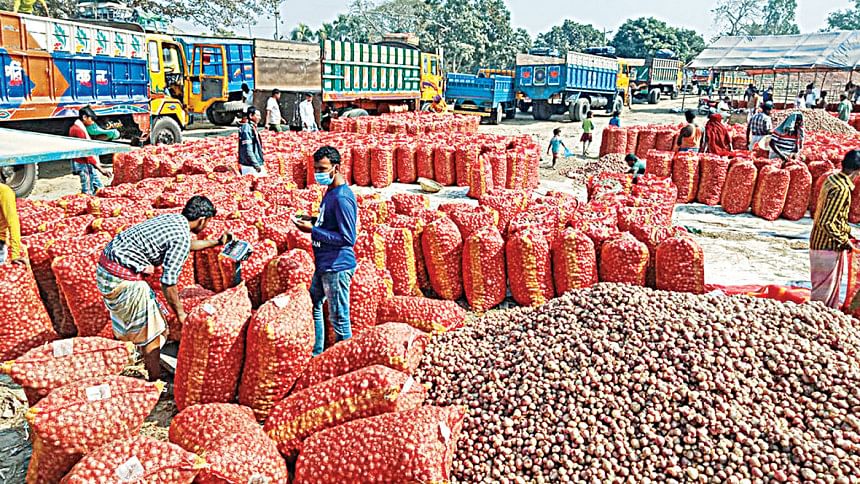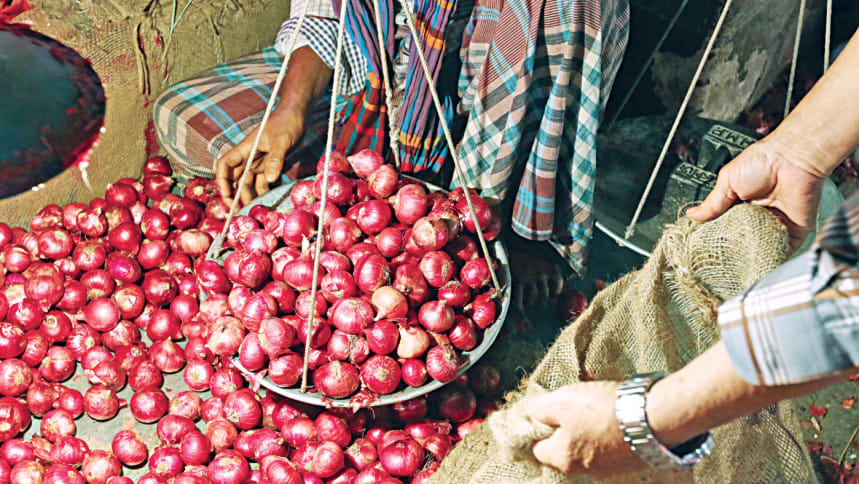Onion farmers in a tight spot for poor prices

Onions previously cost Tk 60-65 per kilogramme depending on quality but prices quickly dropped to Tk 25-35 per kg as of yesterday after farmers began harvesting the bulb at the end of March
Although onion prices were excessively high just one month ago, farmers in Pabna are now struggling to recover production costs due to a supply glut following this year's harvest.
Onions previously cost Tk 60-65 per kilogramme (kg) in Dhaka but prices quickly dropped to Tk 25-35 per kg as of yesterday after farmers began harvesting the bulb at the end of March.
Officials of the Department of Agricultural Extension (DAE) say the low prices are a result of increased supply in wholesale markets while farmers blame the lack of storage facilities for their loss.
Md Kamruzzaman, an onion farmer of Durgapur village in Sujanagar upazila, said he cultivated onions on 70 bighas of land this year to produce more than 2,500 tonnes of the crop.

"But since I have no space to store such a huge amount, I was bound to sell at low prices," he added.
Kamruzzaman sold his onions for about Tk 38-40 per kg during the harvesting season (March-April) in 2021 but this year, the bulbs are going for just Tk 15-23 per kg.
"I spent about Tk 30,000 to cultivate each bigha but I am earning a maximum Tk 26,000 in return," he said.
The situation is similar in Faridpur upazila, where farmers saw bumper yields but remain discontent with poor market prices.
According to DAE officials, a total of 40,079 hectares of land in nine upazilas of the district were brought under onion cultivation this year.
"Farmers got bumper production this year despite the untimely rain that prevented some from planting the crop," said Hazrat Ali, deputy director of the local DAE office.
Most farmers agree that they are having to sell the crop at minimum prices since they have nowhere to store it otherwise.
Montu Khan, an onion farmer of Ulat village in Sujanagar upazila, said it costs him about Tk 27 to produce one kilogramme of onion which can be sold for just Tk 19 in the current market.
"Besides, I am forced to sell them cheap as onions swell up and crack if they are not properly stored," Khan added.
Similarly, DAE officials say onion prices are low as farmers are now bringing the crop en masse to wholesale markets amid the harvesting season.
"After harvesting the crop, most farmers bring it to wholesale markets and so, prices have fallen in the face of increased supply," said Md Mizanur Rahman, deputy director of the Pabna DAE.
Traders of the Sujanagar wholesale market said a minimum of 7,000 tonnes of onions are coming to the market each day amid the ongoing harvesting season.
However, another reason behind the low onion prices is the fact that the government is allowing imports of the bulb despite sufficient domestic supply, according to Shahadat Hossain, senior marketing officer of the Pabna DAE.
Md Bachchu Mollah, a farmer of Chilerkandia village under Saltha upazila, said he heard the government imported onion from different countries and that's why prices are poor in the local market.
"No one thinks about us," he added.
The previously soaring onion prices are what had inspired farmers to cultivate more of the crop and they enjoyed bumper production this year thanks to good weather, said Mizanur Rahman, deputy director of the Pabna DAE.
Pabna accounts for more than 35 per cent of the onions produced all over Bangladesh.
Many farmers are storing onions in their homes but it is not a commercially viable solution and so, most of them are selling their crop at low prices, Rahman said.
He went on to say that they are working to establish an onion storage facility in the region.
"We plan to build an onion storage unit here in Pabna, the country's biggest onion producing hub. The matter has already been discussed in parliament," he added.


 For all latest news, follow The Daily Star's Google News channel.
For all latest news, follow The Daily Star's Google News channel. 







Comments